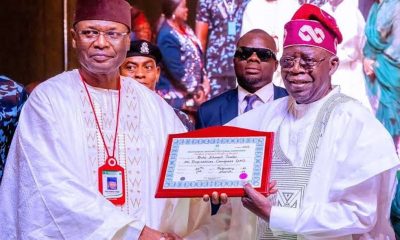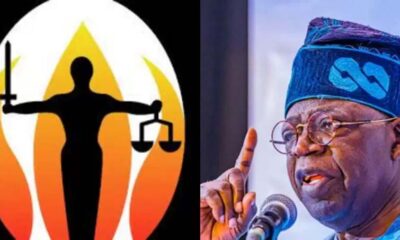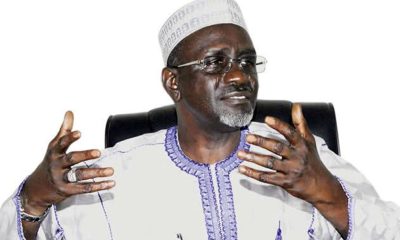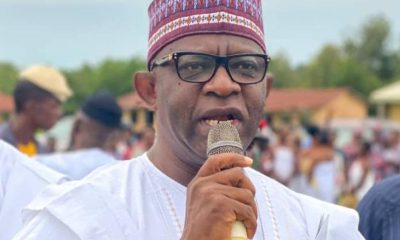Opinion
Why Tinubu must never be Nigeria’s president, by Festus Adedayo

So I was at the Alausa Governor’s Office in Lagos. Accessing the governor was like seeking needle in a haystack. His Press Secretary sent words up that an irritant interloper had come to ferret response to a newsmagazine’s damming expose on the governor. After hours of waiting, a commissioner (names withheld) sauntered in and met me where I sat immovably like Mount Kilimanjaro.
“You can’t write that story,” he began in a steely voice sauced with veiled threats. “Go back to Ibadan. We will talk to your boss.”
That was how the story never saw the light of the day.
The Nigerian Tribune, of which I was its Features Editor during this period, had sent me in pursuit of the facts or fiction surrounding the news magazine report. The principal of that ancient school, Government College Ibadan, at the time had suddenly gone AWOL, incommunicado and inaccessible as the proverbial excrement of the masquerade. Grapevines alleged that Alhaji Lam Adesina, then Governor of Oyo State, had ordered that all data of the school’s attendees between the period of Governor Bola Tinubu’s claim of attendance of GCI be brought to him in the Government House, where they were brought under governmental lock and key. The media that was seeking corroboration or the antonym of the claims, went after the GCI Principal. He had disappeared into thin air. Perhaps, a one-on-one interview with the governor would do?
In 1999, one Dr. Waliu Balogun wrote a petition against Tinubu levelling a number of damning allegations that bordered on fraudulent claims of educational attainments. Among other things, he accused Tinubu of lying in an affidavit attached to his Independent National Electoral Commission form that he lost his degree certificates while he was on exile between 1994 and 1998. The newsmagazine later published those details in a gripping expose which left sour tastes in the mouth.
READ ALSO:
- UAE Shuns Nigeria, Lifts Travel Ban On Ghana, 4 Others
- Tambuwal Rejects NBS’ Ranking Of Sokoto As ‘Poorest’ State
- Why heart attacks occur at night, early in the morning –Cardiologists
One after the other, all Tinubu’s claims, sworn to under oath in the Form CF001 he filled with INEC, were shredded to smithereens by the magazine’s story. St. Paul’s School, Aroloya, Lagos, which he claimed to have attended, the magazine said its investigative reporting found never existed, just as his name was conspicuously missing from the records of the Government College, Ibadan, which he claimed to have attended between 1965 and 1968. Indeed, GCI’s alumni association, the Old Boys of the school, debunked the claim. So also was Tinubu’s claim that he attended Richard Daley College, Chicago, between 1969 and 1971. Punctured also were the governor’s claims of having attended the University of Chicago in the US between 1972 and 1976, as well as obtaining a B.Sc degree in Economics from the university. A request to those institutions for affirmation of Tinubu’s studentship by the magazine was a resounding No. Till date, in spite of his having vanquished the legal principalities spearheaded by Chief Gani Fawehinmi (SAN), with the Supreme Court voiding Fawehinmi on technical grounds, none of Tinubu’s classmates, schoolmates or even teachers has come out in public to counter the facts of the legal behemoth erected against him.
Four years later, in 2003, it was time for Tinubu to fill the Form CF001 again, in pursuit of his second term bid. His enemies who were waiting for him to make those claims again were dazed when they saw what the governor filled. In all the columns, the gentleman simply filled NOT APPLICABLE; Primary School, Not Applicable, Secondary School, Not Applicable and University, Not Applicable. Could that have meant that the man never attended any school?
Tinubu was not alone. Rife as expectations were from the new-found Nigerian republic in 1999, like alligators, renowned for incredible nasal power of smelling a drop of blood even in ten gallons of water, Nigerians smelled crises in the cache of scandals that involved newly elected office holders of the republic. Less than three months after commencement of the Fourth Republic, Nigeria began to manifest noticeable cracks. It took political scientists and students of Marxian dialectics to allay our fears and tell us that those cracks were curative, self-correctional and akin to the Marxist theory of thesis and antithesis which, when they jam, produce a synthesis.
In quick successions of messy, damming scandals, Speaker of the House of Representatives, Salisu Buhari, Senate President Evan(s) Enwerem and Bola Tinubu got entangled in seismic, roiling scandals of identity misappropriation, subversion of their oaths of office and perversion of truth. While the latter two were swept away by the typhoon of the crises, Tinubu not only survived the wire mesh, to spite the allegations, he is today one of top three most consequential, powerful Nigerians alive and a presidential office aspirant to boot.
READ ALSO:
- APC chairmanship: Security agencies compile security report on aspirants
- Troops Gun Down Boko Haram Fighters In Borno
- NDLEA: I’ve made covenant to never traffick in hard drugs, says Obi Cubana
Salisu Buhari, the affable and young Speaker of the lower parliament had just been unraveled by the media as an age inflator and certificate forger. Hitherto, a Kano-based businessman, Buhari shuttled into politics but two weeks into being in office, the rested news magazine, TheNews, in its February 16, 1999 edition, published details of his age and certificate forgery. The magazine wrote that he was actually born in 1970 and not 1963 as he claimed.
Again, TheNews put a lie to Buhari’s claim of having graduated from the University of Toronto, stating that he not only never attended the school, the mandatory youth service he claimed to have underwent at the Standard Construction in Kano was a ruse. On July 23, 1999, like a rain-soaked squirrel, Buhari was contrite, disgraced and admitted all the allegations. “I apologize to you. I apologize to the nation. I apologize to my family and friends for all the distress I have caused them. I was misled in error by a zeal to serve the nation, I hope the nation will forgive me and give me the opportunity to serve again,” he murmured as he resigned from the House. He was subsequently convicted of certificate forgery, sentenced to two years in prison but later got pardoned by President Olusegun Obasanjo.
Senator President, Evan Enwerem, was to kiss the canvass a little while after. In the race for the senate presidency, he had sidestepped his closest sprinter rival for the office, Chuba Okadigbo by 66 to 43 votes. Shortly after his ascension in 1999, Enwerem was shoved into the sieve, scrutinized on allegation of identity opacity. He was held up on the fire-spitting wire gauze for falsification of his name. A ball-fire of controversy erupted on whether Enwerem’s real name was Evan or Evans. In the melee, on November 18, 1999, his ouster, spearheaded by Okadigbo and his allies, became a fait accompli.
Between his consequential emergence on the political turf of Nigeria in 1999 and now, only an armchair, analytical yokel will underrate or belittle Bola Ahmed Tinubu’s awesome and colonizing genius in Nigerian politics. He became so consequential that some translucent analyses compare him to the sage, Obafemi Awolowo. It will appear that immediately he got away from the drowning tidal waves of that identity theft legal tango and the lacerating fisticuffs of his numerous political adversaries, Tinubu tightened his muscles on the political levers of Lagos, a state which had always been the microcosm of Nigeria since it became the federal capital of independent Nigeria in 1960. He saw how the almighty power of the media, like a mammoth whale, almost succeeded in capsizing his ship of state and political career.
Rising from the ashes of the crises, Tinubu encircled his claw-like fists on the media, meandering himself into its total corpus and essentializing himself in its operations. While English crime thriller writer, René Lodge Brabazon Raymond, popularly known as James Hadley Chase, says that fear opens the wallets of the rich, Tinubu’s street chemistry, which he deploys, says that licit and illicit favours, prebends and perks imprison consciences and arrest captives faster than glue gum traps mice. Unconscionably, Tinubu waves these aces with the magisterial clinicality of a professional executioner, succeeding in the process in harvesting a huge political, media, government, judicial, corporate, etcetera clienteles inside his massive pouch.
The truth is that, since 1960, seldom has Nigeria had a political aficionado who deployed the genius of the streets in the service of politics as Bola Tinubu. Scarcely can anybody have the mis/fortune of encountering him without becoming a captive of his cash influence. Someone once said that even the god of Mammon would be envious of Tinubu’s sagacity in deploying its monetary weapon.
Within the span of his Lagos governorship of eight years, from someone who those who knew him said was passably well-to-do, Tinubu grew a monstrous wealth, such that a 2015 back page opinion piece in the Sun newspaper claimed he owned almost half of Lagos and urged Buhari to clone the Vladimir Putin method with which the Russian president neutralized drug czars who funded his presidential emergence. Within this period, Tinubu also acquired a humongous political influence in Lagos and outside of it that could rank that of Pharaohs and emperors of old. In 2007, an ex-governor, who witnessed the miasma of power flakes encircling him as he arrived the Lagos airport, jealously told me that it was godlike.
Superficial analyses of Tinubu claim that his vice-hold grips on Lagos can be found in his ability to recreate and “build” persons in state and national offices, as well as sustaining a linear pattern of succession. This, such analysts claim, reflects his sagacity. Those who know the modus operandi of this power retention system machine however put a lie to it. To them, deep underneath it is an opaque, yet fastidiously maintained and pervasively sustained mega corruption and perpetuation of self hegemony by a carefully mastered mind coercion that is promoted by a cultic abidance to an oath of allegiance.
Those who see Tinubu’s strength in his fluid recruitment of aides should also be able to answer why he suffers huge casualty of his investment in such persons? Could it be that he uses them as indentured viceroy? Or that the rebellion we see from them is an attempt to set themselves free of his hold? From Babatunde Fashola, Muiz Banire, Akinwumi Ambode to his erstwhile lickspittle, Rauf Aregbesola and many others, there must be a single thread that unifies Tinubu’s foot soldiers’ rebellion against him. Unfortunately for Tinubu, this same set of soldiers, knowing the secrets of the sustenance of their power machine, are today against his emergence as Nigeria’s president and will willingly supply the fire that will incinerate his ambition. In Yorubaland today, apart from Lagos and Osun States, which APC governor can Tinubu claim to be under him?
READ ALSO:
- 2023: Tinubu most popular in Northern Nigeria, will emerge APC candidate in Direct or Indirect Primaries —Jubrin
- I became armed robber after I dropped out in JSS 3 – 16-yr-old who rapes older women confesses
- American holds hostages in synagogue for hours
If nothing else, the controversy provoked by Chief Bisi Akande’s My Participations unraveled the mythic notion that Tinubu promotes his aides to the top for the love of country. Back and forth arguments, especially on Vice President Yemi Osinbajo’s nomination in 2015, revealed that not only is the Lagos landlord obsessed with self alone, ascension of others in his loop is secondary and is subordinated to personal interest. The world saw that Tinubu grudgingly acceded to Osinbajo’s candidacy only when his personal interest hit the rocks.
Last week however, Bola Tinubu paid a visit to President Buhari, a few hours after the latter granted an incoherent interview where he claimed that if he named his successor, the fellow could be assassinated. A content analysis of the president’s statement must have revealed to Tinubu that he could never have been the one Buhari was referring to. Tinubu must know that Buhari knows that a plan to murder Death would be easier done than assassinating Nigeria’s Mafia don, the Capo dei capi himself.
The most mis-recommending criterion against a Tinubu presidency is that, in mental depth, the Lagos Landlord is just a whiff higher than Muhammadu Buhari. Remove the Cockney accent he feebly mimics, you will find out that most times, his extempore speeches lack coherence, logic and verve.
Counter arguments have been proffered against the school of thought that says that Tinubu’s ultra-stupendous wealth should not recommend him against vying for the Nigerian presidency. You will recollect that the military apparatchik argued along this line against an MKO Abiola presidency. Abiola, they said, was as wealthy as to grant Nigeria loans. Weak as the argument was, it is strong in Tinubu’s disfavor for its moral and deleterious implications. While the world knew that Abiola’s wealth was procured from international dealings, especially in ITT, Tinubu is said to own a pie in virtually every sector of Nigeria’s economy, ranging from oil, steel, finance (tax), airline, real estate, media, you name it. These are funded in names of shells and proxies. In all these, as the Americans say, we can see the bucks but not the shop. What morality will Nigeria be preaching by having a president of such opaque composition and disposition?
Either real or imagined, it is said that the only thing that is real about Tinubu is his person and that every other ascription on him is a borrowed robe. He has not come in the open to effectively disclaim the allegation that his name is not his name; that the parents he claimed were not his’; that the certificates he claimed to be his are not and that the schools he claimed to have attended didn’t know him. I don’t know a baggage huger than this for a country like Nigeria that is struggling to sell herself to the world to now have its president burdened by this pernicious pedigree.
With the calamity that the Buhari presidency has posed to Nigeria, it will be more calamitous to have a Tinubu as his successor. Governing Nigeria is not all about identifying surrogates who will man critical political offices for future political gains. Nigeria needs a cerebral, healthy, comparatively morally overboard president, a man, borrowing from Oscar Wilde’s description of his gay partner friend, Sir Alfred Douglas in De Profundis, who is not a man for whom the gutter and all that is in it fascinates.
One would have expected Tinubu to heed the counsel of Apala music icon, Ayinla Omowura. Omowura must have had in mind leaders who are heavy-laden, burdened by baggage of their past, when he counseled that, as all shrubs and leaves in the forest should not be the predilection of a herbalist seeking curative herbs; not all palm trees in the forest should excite the palm-wine tapper either. In Yoruba, he expressed this as, “gbogbo ewe ko l’ojawe nja; gbogbo ope ko l’onigba ngun.” Sagacious leaders who carry stupendous moral baggage of the Tinubu hue should know the forests they should venture into.
The forests of presidential contest that the Lagos Landlord is about to venture into is what same Omowura, in his vinyl, referred to as “igbo odaju” – the forest of the heartless, the carapace-hard heart hunters. Anyone who does not have the benefit of a real mother – a real mother’s prayers are like magic, steeped in mystical and metaphysical powers. Anyone, said Omowura, who does not have a real mother who can provide witchcraft protection for them, should not venture into the igbo odaju. Never! Abraham Lincoln, father of American nation, also alluded to this when he said, “I remember my mother’s prayers and they have always followed me. They have clung to me all my life.”
Some Yoruba lament what they call the predilection of Yoruba in pulling themselves down. This piece would be their perfect example. It is thinking like this that has condemned Nigeria to stagnation. The truth is, Yoruba are very proud of their pedigree and wear it like a lapel on their sleeves. So how can same Yoruba who have preached moral uprightness to the rest of the world for centuries, now queue behind a man who cannot point his right hand at his father’s homestead? Let the rest of Nigeria be rotten egg. Yoruba will still underscore societal purity. It should gladden us that Yoruba are the ones revealing the maggots in their home so that when they expose others’ maggots, they will occupy a higher moral ground. It is better for Yoruba not to lift a presidential leg forward than lift one that is riddled with a festering and putrid sore. In any case, what Nigeria needs is a president that is a leader who is not crippled by ill health and is adequately schooled in the nuances of 21st century solutions to our self-inflicted, existential challenges.
Since independence in 1960, six ‘major’ Yoruba sons have attempted a shot at Nigeria’s civilian presidency (excluding fringe aspirants of the Babangida political guinea-pig era). They are Chief Obafemi Awolowo, Alhaji Lateef Jakande, Chiefs Abiola, Bola Ige, Olu Falae and Olusegun Obasanjo. If Tinubu carries through his recent declaration, he will be joining this pantheon. Of this lot, Tinubu would be the only one whose pedigree is shrouded in a miasma of dubiety.
Yoruba will totally support Tinubu in his presidency dream if he agrees to fill in the INEC forms all those claims he made of his roots in 1999. He must fill in the 2023 Form CF001 St. Paul’s School, Aroloya, Lagos, as his primary school; Government College, Ibadan; Richard Daley College, Chicago and the University of Chicago as his alma maters, without Senator Tokunbo Afikuyomi swearing on oath that he filled them for him by proxy.
Eagle
Opinion
Barbaric mass burning of innocents in Edo, by Farooq Kperogi

Barbaric mass burning of innocents in Edo, by Farooq Kperogi
I woke up on Friday morning to a deluge of forwarded, unwatchably terrifying videos showing 16 Hausa hunters, who were traveling from Port Harcourt to Kano for the forthcoming Eid-el-fitr festivities, being lynched and burned alive by a mob of blood-thirsty savages in the town of Uromi in Edo State. I’ve been sick to my stomach.
My inquiry has led me to understand that the Uromi community has been gripped by abductions for ransom, which sometimes result in deaths. Seething with rage and vengeance over the incessancy of deadly kidnapping by “Fulani herdsmen,” the community was primed for jungle justice.
When local vigilantes accosted a bus traveling northward through the town, they found Hausa hunters armed with hunting guns and machetes aboard. In the bigoted, know-nothing estimation of the Uromi vigilantes, Hausa hunters were one and the same as Fulani kidnappers.
So, they burned the innocent Hausa hunters for the crimes of anonymous Fulani bandits. I honestly couldn’t bring myself to watch the dreadfully nightmarish videos to the end.
These sorts of savage slaughters of innocents persist in Nigeria not just because of a progressive loss of faith in formal institutions for the redress of communal grievance, heightened anxieties about safety, and increasing faith in the efficacy of jungle justice but also because of the absence of consequences for them.
As I pointed out when Deborah Yakubu was extrajudicially murdered by a mob of unhinged fanatics in Sokoto in May 2022, there is no greater enabler of jungle justice than a lack of consequence for it.
Sadly, when tragedies like this occur, there is a habitual, safe, standard, prepackaged rhetorical template that people in government effortlessly regurgitate. They promise to bring the perpetrators to justice, make performative arrests to quench public thirst for justice, and nothing else happens. That can’t continue.
When I called for the prosecution and public execution of the murderers of Deborah in 2022, I warned that it was necessary “to serve as an example to other would-be murderers.”
READ ALSO:
- Investigation of wanted businesswoman Achimugu not linked with Atiku, Sanwo-Olu – EFCC
- No Sallah durbar festival in Kano this year – Police warn
- $100m coin collection buried for decade to be auctioned
Of course, Deborah’s murder wasn’t the first example of jungle justice. Harira and her four children were ferociously murdered by maniacal thugs in Anambra State, and nothing was done about it. The list is too long to fit in a newspaper column. But I argued that it’s never too late to do the right thing.
I will repeat my plea. The murderers of these innocent travelers are easily identifiable from the videos that are circulating online. They should all be apprehended, tried, and executed in public to deter a repeat.
But, in the interest of proportionality of justice, this should not be limited to this Uromi incident. All cases of jungle justice should equally be punished the same way. The punishment for murder in both the Criminal Code and the Penal Code is death. The law should be followed.
Another thing that this incident instantiates is the danger of toxic ignorance. Before Muhammadu Buhari became president, all northerners in southern Nigeria used to be “Hausa,” irrespective of their ethnic and religious identities.
After Buhari became president, every northerner, especially if the northerner is also Muslim, became “Fulani,” which led me to write a June 5, 2021, column titled, “‘Fulanization’ of the North by the South.” The South, I wrote, was relentlessly rhetorically Fulanizing the North, particularly the Muslim North, just to fertilize and sustain a simplistic narrative.
This simplistic, misbegotten narrative probably led the Uromi mass murderers to assume that Hausa people with hunting instruments must be Fulani bandits since they have internalized the wrongheaded notion that all northern Muslims are “Fulani.”
Never mind that Hausa and Fulani communities in many northwestern states are at daggers drawn over kidnappings for ransom by Fulani outlaws, or that more northerners are kidnapped for ransom than people anywhere else in the country.
Trust TV, the broadcast arm of Daily Trust, did an informative documentary on March 5, 2022, titled “Nigeria’s Banditry: The Inside Story” that brought the tension between Fulani herders and Hausa people into focus.
A subsequent July 25, 2022, BBC Africa Eye documentary titled “The Bandit Warlords of Zamfara,” which got the hackles of the Muhammadu Buhari administration up, amplified the tensile relational dynamics between Hausa and Fulani communities in the northwest since kidnapping for ransom took roots in the region, transmuted into full-on terrorism, and finally morphed into the full-scale Hausa-versus-Fulani ethnic war, particularly in such states as Zamfara, Kebbi, and Katsina.
In response to the rural and urban banditry by mostly Fulani brigands against Hausa people in the northwest (Fulani people have also accused Hausa people of cattle theft, indiscriminate murders, and systematic exclusion), the BBC documentary tells us, Hausa people formed or strengthened preexisting vigilante groups called yan sakai or yan banga for self-defense against bandits.
READ ALSO:
- EFCC re-arraigns son of ex-PDP chairman for alleged N2.2bn oil subsidy fraud
- Group says Natasha’s recall will deepen democracy
- We welcome Gov Makinde’s U-turn on Shari’ah panel – MURIC
Yan banga groups originally come from traditional Hausa hunters’ associations and draw upon the skills and rituals commonly associated with traditional hunters (such as using charms, dane guns, and other traditional weaponry) for vigilante duties.
In other words, most of the Hausa hunters that the Uromi homicidal beasts murdered in cold blood to avenge the banditry of Fulani herders would be targets of elimination by Fulani bandits in the northwest. That’s double jeopardy.
The northwest is the theater of a ceaseless spiral of recrimination and reciprocal violence between the Hausa and Fulani communities, thereby imperiling the longstanding, Islamically-inspired ethnocultural synthesis that historically unites them.
Remarkably, this volatile dynamic persisted largely unnoticed by both national and global media until it was thrust into international consciousness through BBC Africa Eye’s seminal July 2022 “The Bandit Warlords of Zamfara” documentary.
The documentary revealed the paradoxical reality wherein, despite substantial overlaps in culture, religion, heritage, and linguistic traditions, the Hausa and Fulani populations remain predominantly segregated, particularly in rural areas. Intercommunity relations are characterized by persistent tensions that manifest in conflicts over scarce resources such as land, water, and sustenance.
But the rest of Nigeria has a hard time grasping the existence of tensile ethnic stress between Hausa and Fulani people in the north on account of banditry because the southern-dominated institutional news media in Nigeria, which help frame how we make sense of our social and cultural realities, lack ready-made, stereotypical mental representations with which to frame the conflict, so they either avoid reporting it altogether or minimize its horrors if they report it at all.
The news media thrive on Manichean binaries, conflictual differences, and sensation, which a conflict between Hausa and Fulani people doesn’t present. After all, a popular Yoruba epigram says, “Gambari pa Fulani ko lejo ninu,” which roughly translates as “If a Hausa person kills a Fulani person, there is no case,” implying that the Hausa and the Fulani are indistinguishable.
I have also read many northerners on social media encouraging a retaliation over the Uromi massacre of Hausa hunters. That would be most unfortunate for at least three reasons. First, the people who committed the murders are easily identifiable. Indiscriminate murder of innocent southerners in the north for a crime committed by a recognizably small group of people violates not just the law of the land but also Islamic precepts.
Surah Al-Ma’idah (Chapter 5, Verse 32) of the Qur’an says, “whoever kills a soul…it is as if he had slain mankind entirely. And whoever saves one—it is as if he had saved mankind entirely.”
Second, based on the experiences of the past, one can almost guarantee that innocent, law-abiding Igbos in the north would bear the brunt of any “retaliation” even though Uromi in Edo State isn’t an Igbo town.
The town is populated by the Esan people who, although they constitute a major ethnic group in the state, are not the majority in the state. They also don’t have a numerically significant presence in the North, so innocent southerners would be murdered in cold blood.
Finally, killing innocent southerners in the North for the crimes of a few people would be identical to the crimes of the Uromi vigilantes that the retaliators are supposedly avenging.
I hope the president and the governor of Edo State will act expeditiously to contain this upheaval and prevent it from snowballing into a bigger problem than it should.
Barbaric mass burning of innocents in Edo, by Farooq Kperogi
Farooq Kperogi is a renowned Nigerian columnist and United States-based Professor of journalism.
Opinion
How Wande Abimbola rejected IBB’s ING bait, and other stories (2)

How Wande Abimbola rejected IBB’s ING bait, and other stories (2)
Tunde Odesola
(Published in The PUNCH, on Friday, March 28, 2025)
Once upon a time in the land of Ìwásè, Orunmila, Yoruba god of Wisdom and Divination, thought to showcase Yoruba science, divination, arts and philosophy to mankind; so, he codified the four aforementioned essence of human existence into a body of knowledge called Ifa.
As science, Ifa embodies the study and prescription of herbal medicine for healing, with its practitioners being ‘babalawo’ or ‘iyanifa’ (male or female Ifa priests) and ‘onisegun’ (medicine men or women). Ifa, as science, unravels astronomy, time cycles, and energy balance in understanding cosmology – the science of the origin and development of the universe.
Ifa’s science is also contained in its corpus called Odu Ifa, a humongous collection of 256 voluminous books, passed down orally within Yoruba culture. The 256 books are a cornucopia of Ifa literature containing stories, poems, revelations, findings, assertions, songs, taboos, laws, etc that explain the Yoruba worldview on far-ranging issues of existential proportions. The vast 256 collections of voluminous books are divided into 800 sections, making the totality of the corpus 204,800 compendia of orature.
In the 256 Odu Ifa is the coded knowledge system called the binary coding found in computer science, and derived from mathematical probability, observation and pattern recognition. With this similarity, Ifa shows an amazing connection between ancient wisdom and modern technology. Abimbola says no other religion has more body of books, noting, however, that adherents of foreign religions in Nigeria erroneously throw away the science, arts, divination and philosophy of Ifa for imported religions that are not better. “Something is wrong with us,” he says.
He continues, “I am not a Christian, but I use western medicine when necessary – along with herbs and divination. You might not be an Ifa worshipper, but that shouldn’t stop you from benefiting from its truths, which are so natural and pure. The truths of Ifa are contained in its accurate divination, diagnosis, treatment and healing. The efficacy of Ifa explains why you find people of other religions sneaking to it in secret and benefiting from it while pretending publicly not to have anything to do with it.”
READ ALSO:
- FG declares public holidays for Eid-el-Fitr
- JUST-IN: Ex-Oyo gov Ajimobi’s first child Bisola dies At 42
- Crisis hits LagRide, drivers threaten protest as operators move to withdraw vehicles
The art of Ifa is seen in its rich poetic recitations, panegyrics, historic accounts, music, storytelling and symbolism, just as Yoruba sculpture, smithing, beadwork, weaving and many other art forms are believed to be inspired by the gods.
As philosophy, Ifa teaches moral and ethical wisdom symbolised by Orí (Destiny), Èsù (Choice and Consequence), Ìwà Pèlé (Good Character), Omolúàbí (Virtue), Owú (Jealousy), Ìbínú (Anger), and Ànìkànjopón (Greed), among other behavioral traits.
Through divination, Ifa offers insights into the past, interrogates present possibilities and reveals future prospects while prescribing solutions via sacrifice, rituals, offerings, or behavioral changes. Ifa divination involves an interactive engagement that gives room for guidance and encourages personal responsibility.
According to Abimbola, ‘writing is an enemy of remembrance’. What do you mean, sir? I asked. “The 256 Ifa corpus can be sectionalised into 800 large volumes. This means there are 204,800 volumes of verses, recitations, poems, stories, etc in the corpus. In prehistoric times, the whole of the corpus was crammed by Ifa students, but nowadays that they are in book form, people are forgetting them. That’s why I said writing is an enemy of remembrance. When I was in school, I didn’t jot down notes during lectures; I preferred to listen and understand first, and form my notes later, from my understanding. In writing my notes, I borrowed the notes of my classmates who had jotted down notes. My style gives room for deeper comprehension,” Abimbola explains.
The Araba of Osogbo, Chief Ifayemi Elebuibon, affirms the tenet of loyalty in Ifa corpus, reciting the Ìwòrì Bògbé verse during a telephone chat with me, when I asked for an esè Ifa that teaches loyalty.
Ogunwande exemplifies the loyalty displayed by the partridge in the Ìwòrì Bògbé verse of Ifa, which Elebuibon describes as the story of the partridge, who having wined and dined with the houseowner, will not desert the houseowner in time of trouble, “eyele kii b’onile je, ko b’onile mu, ko di ojo kan ijongbon, ko yeri.”
When MKO, the friend of his youth, came under political oppression after winning the June 12, 1993 presidential election, Abimbola stood by him like Jonathan stood by David in the Holy Bible.
Abimbola said, “Twice, they made me offers to head the Interim National Government. Firstly, I asked those sent by the military authorities if, after being sworn in as Head of State, I could pronounce that the election would be held afresh? Secondly, I dilly-dallied by saying the seven-month lifespan of the ING was too small to do anything. Thirdly, and morally, I couldn’t do that to a friend. Fourthly, and above all, I consulted Ifa, and Ifa told me in unmistakable terms to reject the ING offer.
READ ALSO:
- Rivers administrator Ibas fires Fubara’s political appointees
- Natasha: Murray-Bruce slams Atiku, defends Akpabio
- Tinubu shops for new INEC chairman for 2027 elections
“A few days after the offer was made to me, Abiola called a world press conference. We were all present at the conference where he announced the full results of the election. A day after the press conference, Ernest Shonekan was announced as the Head of the Interim National Government. I was happy I didn’t betray my friend. I would have regretted all the days of my life if I had accepted the offer.”
Named Ogunwande because his forebears were the spiritual heads of Ogun worshippers in Oyo, the Awise Agbaye says all the children of his grandfather and father bear Ogun in their names.
And, Ògún, the Yoruba god of Iron and War, was king over Irè, hence the appellation Ògún Ònírè. But Ògún wasn’t an indigene of Irè, a town in Ekiti; he only stopped by Irè-Ekiti on the way from an expedition with his men. Abimbola reveals Ògún was a native of Sakí, though he lived in Ile-Ife.
According to a myth, Ògún, thirsty and tired, came across some palm wine gourds as he passed through Irè. He stopped and lifted one of the gourds, hoping to quench his thirst. But the gourd was empty. He lifted the second, third and fourth gourds; all were empty. He became incensed and broke the four gourds and more, ordering that henceforth, empty gourds should be laid sideways while empty calabash for drinking should be placed face down. Ogun later rose to become the king of Ire.
The Ogun courage of Ogunwande came to bear when he thwarted the efforts of his fellow senators who attempted to fix their salaries during the Third Republic. He said, “As soon as we were inaugurated, senators began agitating to legislate and fix our salaries. As Majority Leader, I presided over intra- and inter-party caucus meetings. They said I should call a meeting for us to discuss the issue. I delayed by saying we should wait till the President and his ministers were sworn in before we discuss our salary.
“They would have beaten me up if not for the aura (òwò) innate in my personality. They would hear none of my advice. During one of our arguments over the issue, I asked some of them, “Are you here for money or service?” They looked at me in shock and asked, “If you’re not here for money, what are you here for? After some days of stand-off, I called a meeting of the elders of both parties – the Social Democratic Party and the National Republic Convention – and explained why I felt we shouldn’t fix our salaries.
“I said if we fix our salaries now and the President and his cabinet come in and fix their salaries lower than ours, are we not going to look greedy and stupid? When I said this, they saw reason with me. They said, ‘You should have explained it clearly like this. We shall wait’.”
Abimbola’s view on Yoruba bulletproof
All hell broke loose on November 26, 2020, a day the devil himself was appeased to drink water, and cease hostility. That date was an ‘ojo buruku, esu gbomimu’ day, when some suspected kidnappers shot the second-in-command to the gods of the land. It was the day the Olufon of Ifon, Oba Adegoke Adeusi, a first-class Ondo monarch, was felled by the bullets of assailants in Elegbeka community of Ose Local Government Area.
Abomination! No one sacrifices the child of Orè to Orè; ‘ai fi omo Orè b’Orè!’ The igbakeji orisa cannot be killed just like that, I thought. Shocked and sad, I called the Ooni of Ife, Oba Adeyeye Ogunwusi, to ask what happened to the efficacy of Yoruba bulletproof aka ayeta, if a first-class Yoruba oba could be gunned down just like that.
I grabbed my pen, scratched my head and penned the article, “Can African bulletproof stop AK-47 bullets?”, published in The PUNCH, on January 18, 2020.
In the article, the Ooni said the Yoruba had bulletproof ‘ayeta’ aka ‘odeshi’ for bullets. Ogunwusi said, “Everything has a name. If you call ‘ota’ (bullet) by its real name, it’ll deflect bullets from you. Even when the bullet hits its target, it won’t have any effect. This is why it’s called ‘ayeta’. But it has its taboos.”
Yoruba activist, Sunday Adeyemo, aka Sunday Igboho, supported the view of the Ooni, but a former Governor of Osun State, Prince Olagunsoye Oyinlola, who’s a retired Brigadier General, disagreed, saying there was no ‘ayeta’ for AK-47, a view supported by Elebuibon.
To be concluded.
Email: tundeodes2003@yahoo.com
Facebook: @Tunde Odesola
X: @Tunde_Odesola
Opinion
Tinubu as yesterday’s rebel and today’s tyrant, By Farooq Kperogi

Tinubu as yesterday’s rebel and today’s tyrant, By Farooq Kperogi
President Bola Ahmed Tinubu’s demonstrably unconstitutional suspension of the elected leaders of Rivers State and his illegal imposition of a retired military lickspittle as sole administrator in the exercise of his otherwise constitutional privilege to declare a state of emergency in any part of the country is the latest addition in a long list of instances of his embrace of the very things he once resented and fought against when he was outside the reins of federal power.
For example, he was brutally censorious of Goodluck Jonathan’s withdrawal of fuel subsidies in 2012. He expressed sentiments in writing and in speeches that resonated with the angst of the masses. He even helped finance a nationwide mass protest that so convulsed the country that Jonathan was compelled to back off his plans.
Yet, one of the first acts Tinubu did as a president in May 2023 was to announce an economically and socially disruptive withdrawal of fuel subsidies that has deepened poverty, annihilated the middle class, and ruptured the very fabric of Nigerian society.
Again, when Olusegun Obasanjo unconstitutionally suspended Plateau State’s Governor Joshua Dariye—along with state legislators— in May 2004 and appointed General Chris Ali as the state’s sole administrator, then Governor Bola Ahmed Tinubu of Lagos rightly called the act “illegal.”
“It is unfortunate and illegal,” he said. “This has to be discouraged. It is a bad precedent. What the president of the country has done, I pray it doesn’t stand.”
In fact, when Goodluck Jonathan declared states of emergency in the three northeastern states of Borno, Yobe, and Adamawa without suspending the elected leaders of the states, which I commended in a May 25, 2013, column titled “The Malcolm Xian Logic in Jonathan’s Praiseworthy Boko Haram Offensive,” Tinubu condemned it as unacceptable federal overreach.
READ ALSO:
- Communal Clash: Gov Adeleke imposes new curfew on Ifon, Ilobu communities
- BREAKING: IGP redeploys 38 police commissioners
- Osimhen breaks Odegbami’s Eagles goal record
“No governor of a state in Nigeria is the chief security officer,” he said. “Putting the blame on the governors, who have been effectively emasculated, for the abysmal performance of the government at the centre which controls all these security agencies, smacks of ignorance and mischief.”
He contended that Jonathan’s action “seeks to abridge or has the potential of totally scuttling the constitutional functions of governors and other elected representatives of the people” and that it would be “counterproductive in the long run.”
Given an opportunity to give materiality to the principles he espoused when he had no access to federal power, he has become indistinguishable from, and in many cases worse than, the objects of his erstwhile censure.
Tinubu now implements the same policies he once condemned and has become the same personality he once reviled. He exemplifies the aphoristic wisdom (often attributed to historian Ariel Durant or her husband Will Durant) that says, “Today’s rebel is tomorrow’s tyrant.” In Tinubu’s case, he was yesterday’s rebel and today’s tyrant.
Why do most people who initially invested symbolic and political capital in fighting against authority or oppression eventually become the very oppressors they once resisted? Why do firebrands and idealists often morph into the very thing they once denounced after assuming power?
The evidence of history shows us that resistance to tyranny can, and often does, end in new tyrannies. Critics of war or corruption frequently adopt those same practices when they find themselves in the circles of power.
So, this is beyond Tinubu as a person, who probably never really had any principles to begin with, whose resistance to past oppressive policies was probably mere calculative opportunism.
But why do previously genuinely adversarial people become the very things they once opposed with such regularity? Observers from psychology, philosophy, and political theory have long studied this phenomenon.
A previous column I wrote (and republished twice) on the psychology of power pointed out that “people under the influence of power are neurologically similar to people who suffer traumatic brain injury” and posited that situational, power-induced brain damage may be responsible for this.
READ ALSO:
- 2026 WCQ: Super Eagles move up to third place with 2-0 win in Rwanda
- Nnamdi Kanu returns to court, apologises over attacks on judge, others
- Binance delists five cryptocurrencies
Philosophers have also grappled with the paradox of noble ideals curdling into oppression. Friedrich Nietzsche, for example, famously warned of the moral danger that comes with fighting evil too intensely. “He who fights with monsters should look to it that he himself does not become a monster,” Nietzsche wrote, adding, “if you gaze for long into an abyss, the abyss gazes also into you.”
Nietzsche’s metaphor speaks to how the struggle for power or justice can warp people’s souls. Revolutionaries and reformers, in attempting to vanquish a “monster” (e.g. a tyrant or an unjust system), may take on the very methods and mindset of that monster.
His concept of the “will to power” also suggests that the drive to attain power can override other moral constraints, so that once the will to power is unleashed, individuals rationalize actions that serve dominance.
French theorist Michel Foucault provides another lens through which we can make sense of the phenomenon of people taking on the very methods and mindset of the beasts of power they once fought.
He said, “Power is everywhere; not because it embraces everything, but because it comes from everywhere.” By that, he means no one is ever truly outside power relations; even the most vicious critics of the most monstrous regimes operate within a field of power. Once the critics take control, he said, they often reproduce the very power dynamics they once criticized, even if their rhetoric changes.
The line between oppressor and liberator can blur: the roles may switch, but the play remains the same. Foucault’s insight is that systems of power tend to self-perpetuate, regardless of who is at the helm, unless conscious effort is made to dismantle those underlying structures.
In other words, a change in leadership without a change in what Foucault calls the “microphysics of power” is likely to yield similar repressive outcomes. The new boss becomes “same as the old boss,” because the circuitry of power channels them into that role.
That’s why the sadly familiar pattern of “condemning in opposition, then doing in government” is so widespread that it almost seems like a political law of gravity. It’s good to bear this in mind as we read and listen to the pronouncements of current “opposition” politicians who seem like they identify with popular causes and sentiments.
READ ALSO>:
- Akpabio told me I’d make good movements with my waist – Natasha
- Supreme Court declares Wike’s ally Anyanwu as PDP National Secretary
- Why we want Natasha out of Senate – Kogi Central constituents
Like Tinubu, today’s opponents of executive overreach may extend their own executive powers once they have the opportunity.
Like Tinubu, they will have a story to tell themselves and the public to justify their U-turn: the situation is different, their actions are for the greater good, their previous stance was based on incomplete information, etc. And indeed, sometimes circumstances do legitimately change.
But when the dust settles, the outcome looks awfully familiar. Pro-democracy activists become a congress of tyrants and justifiers of tyranny; the fierce social critic and human rights activist who once decried abuses now defends them; the liberator who once raged against oppressors now only liberates his stomach. As the Roman philosopher-politician Cicero once wrote, “It is easier to criticize than to do better.”
Fortunately, this cycle is not inevitable. Many thinkers advocate checks and balances, institutional limits, and personal integrity as antidotes, although even those seem to be insufficient.
Nigeria’s National Assembly, as we have seen in the last few years, particularly in the last few days, can neither check nor balance the excesses of the executive. It’s a slavish extension of Aso Rock. The voices of the few honest, conscientious ones among them are drowned out by the cacophony that the rapacious, unprincipled, mercenary self-seekers among them, who constitute the majority, emit. The judiciary is even worse.
It is easy to be disillusioned and to surrender amid this reality. To be frank, I have found myself in that state many times. But power must be continually guarded and checked. Philosopher Hannah Arendt observed that only constant vigilance and a commitment to plurality and law prevent rebels from calcifying into tyrants.
We must all do our part to hold people in power to account, even if we’re not sure we would do better ourselves. At this point, the only check and balance against creeping tyranny is the democratic rebellion of the people.
Tinubu as yesterday’s rebel and today’s tyrant, By Farooq Kperogi
Farooq Kperogi is a renowned columnist and United States-based Professor of journalism.
-

 Uncategorized24 hours ago
Uncategorized24 hours agoBreaking: Moon sighted in Saudi, UAE, others, Eid-Fitr holds Sunday
-
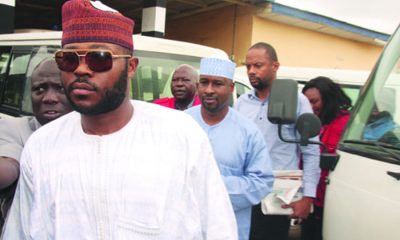
 metro2 days ago
metro2 days agoEFCC re-arraigns son of ex-PDP chairman for alleged N2.2bn oil subsidy fraud
-

 metro19 hours ago
metro19 hours agoRamadan ends in Nigeria, Sultan announces March 30 as Eid-el-Fitr
-
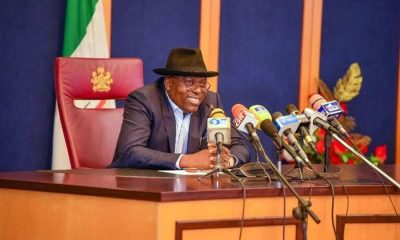
 metro1 day ago
metro1 day agoFubara reacts as Ex-HOS, Nwaeke accuses him of bombing oil pipelines, Rivers Assembly
-
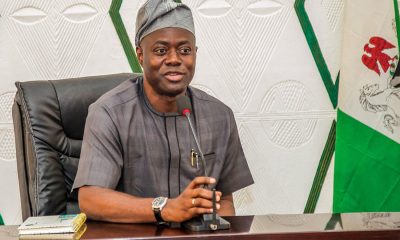
 metro2 days ago
metro2 days agoWe welcome Gov Makinde’s U-turn on Shari’ah panel – MURIC
-

 Opinion1 day ago
Opinion1 day agoBarbaric mass burning of innocents in Edo, by Farooq Kperogi
-

 Uncategorized2 days ago
Uncategorized2 days agoObasanjo’s position on Rivers emergency rule hypocritical, says Presidency
-
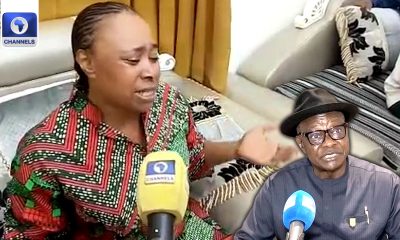
 metro1 day ago
metro1 day agoEx-Rivers HoS wife cries for help over husband’s safety



